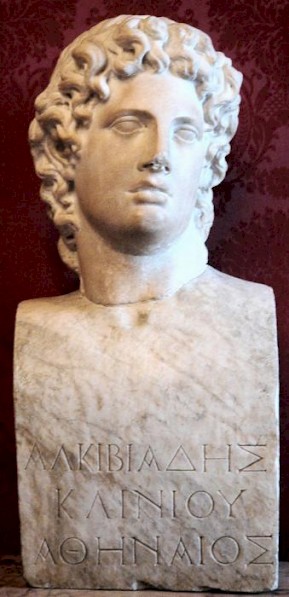Aigospotamoi (8)
Aigospotamoi: the final battle of the Peloponnesian War (431-404). In September 405, the Athenians were decisively defeated by the Spartans and lost their navy. As a result, the siege and fall of Athens became inevitable.
Battle 2: Alcibiades' arrival

Because they needed a quick victory, the Athenians decided to ready their fleet every morning and sail out to Lampsacus to tempt the Spartans into battle. Lysander, however, was not to be tempted. This repeated itself for five days on end, leading - one may assume - to increased frustration among the Athenian admirals. During this time something unanticipated occurred, heightening the tensions at Athenian headquarters even more. The exiled Alcibiades appeared on the scene.
According to Xenophon, Alcibiades merely warned the admirals about the undisciplined inclinations of their troops. He did not offer them any assistance, nor did he persevere when his advice was ignored. This does not at all sound like the master manipulator Alcibiades we know. Considering his past, his arrival can hardly be explained by a sense of patriotism.note
Diodorus of Sicily mentions that Alcibiades demanded a share in the command in change for advice and military support.note Alcibiades advised to move the fleet to Sestos, so that the army would be ensured of supplies - of which the admirals were already aware. The military support Alcibiades pledged consisted of the contingents of the Thracian kings Medocus and Seuthes, with whom he was on friendly terms. With this backing, Alcibiades assured that he would be able to force a battle, either by land or by sea. His motivation was that he wished to gain "a great victory" for Athens, in the hope that he would be forgiven his earlier treachery. According to Diodorus, this offer was refused.
The reason was that the admirals feared that, in case of a defeat, they would be held responsible, but in case of victory all praise would go to Alcibiades. In addition Wylie points out several possible factors that could have played a part in the declining of Alcibiades' aid.note Most likely the Athenian admirals would have doubted - from a logistical and political point of view - whether Alcibiades could provide the promised military support. Alcibiades might well be assured of Thracian troops, but these troops were on the wrong side of the Hellespont. For them to be effective they would have to be ferried across - under the watchful eye of Lysander - by a large number of Athenian ships. Above all, the chance that the Persian satrap of Hellespontine Phrygia would allow hordes of Thracians to disembark seems very slim.
Wylie's reasoning, in my opinion, is convincing in that it strengthens Diodorus' account of the arrival of Alcibiades. However, the question remains: Why did Alcibiades expect his proposal to be acceptable? Except for Adeimantus and Eryximachus, they were his political opponents. Wylie answers this question by assuming that Alcibiades did not sincerely believe his proposal would be accepted, but that he had been bought by Lysander to stir up matters in the Athenian camp. Lysander had time on his side and while the enemy admirals would be discussing Alcibiades' offer, their undersupplied fleet would weaken even more. Unfortunately for Lysander, Alcibiades' presence was not tolerated at the Athenian headquarters. Alcibiades was dismissed with the words that they were the admirals now, and not he.